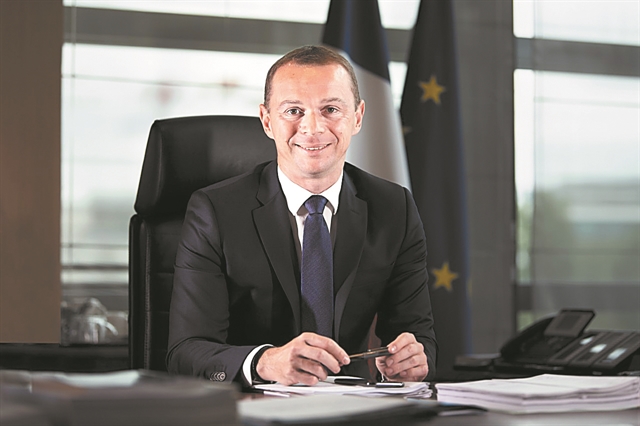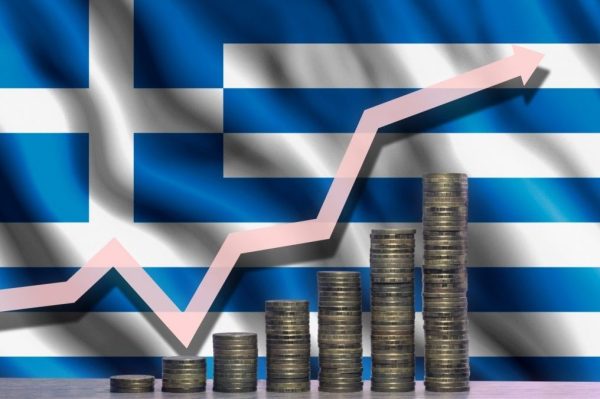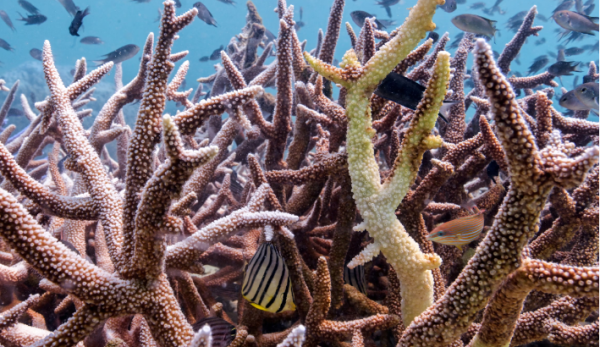
Greece has made great progress in structural reforms in the last two years and is entitled to exit the post-memorandum regime of enhanced supervision in 2022, says the French Deputy Minister of Economy, Finance and Recovery (responsible for fiscal policy) Olivier Dussopt who visited Athens.
Mr Dussopt, whose country holds the rotating presidency of the EU Council next semester, said questions needed to be raised in the debate over changes to the Stability and Growth Pact were essentially saying that the rules could not cover all situations and must have the necessary flexibility to meet the needs of all Member States.
Mr Olivier Dussopt, France is taking over the rotating presidency of the Council of the EU in the first half of 2022. What are your economic priorities?
“Our President Emanuel Macron will soon announce the priorities of the French Presidency of the Council of the European Union. Our presidency coincides with a period when European news is rich, while Europeans are preparing projects on a very large scale. We are coming out of the COVID-19 crisis with acquis that we must take advantage of. I am referring in particular to the European Recovery Plan, as well as to the growing awareness of the need to invest in the green economy, the digital transition and the protection of Europeans and their sovereignty. Our priorities emerge effortlessly from these four major goals. This is an exciting political moment from which we want to make the most to the benefit of all Europeans. The whole of the French Government has mobilized around this goal. We have great ambitions for Europe. The European edifice is part of the identity of our governing majority. For these reasons, we want to make our presidency an opportunity to boost Europeans’ confidence in the Union.
The crisis that has plagued us for two years has helped us to measure the value of friendship between European peoples. In order to convey this message, a few weeks before our presidency, I wanted to travel to the countries of many of our European partners, starting with Greece, which has always had a special relationship with France, further strengthened by the recent conclusion of a strategy agreement. partnership between President Macron and Greek Prime Minister Kyriakos Mitsotakis “.
I’m sure you know that a wide – ranging dialogue has already begun in the EU on possible changes to the Stability and Growth Pact. What changes does Paris believe are possible and necessary?
“The real debate here is, in depth, the issue of the Union’s economic policy: we know that we need significant investment to change the European economy, and the sustainability of public finances is also essential to the stability of our common currency. We also know that economic and fiscal policy coordination is necessary to protect Europeans and the European economy. As French Minister for Budget, accustomed to overseeing public deficit control and debt sustainability, I am aware that this debate overlaps a dual reality. We need rules for our public finances to safeguard the future.
However, the rules will never cover all possible situations: discretion is essential to take into account the situation of each Member State and design the most appropriate response.
On 19 October, the Commission Communication made an interesting account of the first discussions on the subject.
It takes time to ask the right questions: Is the governance framework we have well adapted? If not, what smarter rules can we devise?
In France, our Parliament is currently adopting a bill that sets the first boundaries for the modernization of public finance governance. “Regardless of the answer we give, among Europeans, the result matters, because we have no choice: we need to protect business, take care of the growth of economies and reform them so that we can be present for decades to come.”
Greece will leave enhanced supervision in 2022. There is also growing interest in investing. How do you see the Greek economy and the government’s reform agenda? And how will the Greek-French economic cooperation proceed?
“Relations between Greece and the EU have been turbulent in the last decade, but I believe that the way out is successful.
1. Because the growth forecast for 2022 is around 6%, which proves the success of the reforms that have been launched.
2. Because the country’s change in all areas has been remarkable: in two years, more than 200 bills have been passed by the Greek Parliament, including many structural reforms that fully justify the end of enhanced surveillance from next year.
I am sure that this economic recovery will continue after 10 years of crisis and I know to what extent the decade has been difficult for the Greeks. I am glad that the bilateral relationship with France has fully played its part in this recent history. We are the fourth economic partner of Greece with 120 French companies located in Greece. France is present at the meeting of the Greek recovery.
Just one example, French companies such as Akuo and Aiglon are investing in turning Halki into a 100% ecological island.
The same goes for cooperation between our states. Together, we have made great efforts to improve the functioning of our administrative services, particularly in the areas of taxation and customs. My visit is aimed at strengthening these ties. “For example, co-operation between the French and Greek customs authorities, as well as with the Ministry of Merchant Shipping, is a vital risk for the protection of the EU’s borders.”
“Inflation requires attention”
European economies face the challenge of adapting to the post-pandemic era, while pursuing “green” and digital transformation. How difficult will it be to adapt? Are you worried about rising inflation?
“The European Recovery Plan decided on 21 July 2020 has been a rapid response of historical significance. It represents € 750 billion, without taking into account the Community budget for the years 2021-2027, which strengthens priority programs, in particular on research, public health and education. This is a qualitative leap since for the first time from the principles of European construction these expenses are financed by a European loan! The implementation of the European recovery itself is already a major task: France, like Greece, has had to work in recent months on its national recovery and resilience plans. In the medium term, this means that new own resources must be created for the EU, ensuring that its economic growth is accompanied as closely as possible. When I see that we have succeeded in making this unprecedented crisis a new stage in the deepening of the EU, I can only remain optimistic! On inflation, it is obviously a point that needs attention, but we have not yet come far enough out of the crisis to judge whether price increases will be long-term. “Looking at the situation from the French point of view, the priority is to protect Europeans, especially the weakest ones, against rising energy prices.”
Latest News

WTTC: Travel & Tourism to Create 4.5M New Jobs in EU by 2035
This year, international visitor spending is set to reach 573 billion euros, up by more than 11% year-on-year

IMF: US Tariffs Shake Global Economy, Outlook Downbeat
IMF slashes global growth forecast to 2.8% as U.S. tariffs create uncertainty and ‘negative supply shock

First Step Towards New Audiovisual Industry Hub in Drama
The project is set to contribute to the further development of Greece’s film industry and establish Drama as an audiovisual hub in the region

Airbnb Greece – Initial CoS Ruling Deems Tax Circular Unlawful
The case reached the Council of State following annulment applications filed by the Panhellenic Federation of Property Owners (POMIDA)

Mitsotakis Unveils €1 Billion Plan for Housing, Pensioners, Public investments
Greek Prime Minister Kyriakos Mitsotakis has announced a new set of economic support measures, worth 1 billion euros, aiming to provide financial relief to citizens.

Alter Ego Ventures Invests in Pioneering Gaming Company ‘Couch Heroes’
Alter Ego Ventures' participation in the share capital of Couch Heroes marks yet another investment by the Alter Ego Media Group in innovative companies with a focus on technology.

Corruption Still Plagues Greece’s Driving Tests
While traffic accidents continue to claim lives on Greek roads daily, irregularities and under-the-table dealings in the training and testing of new drivers remain disturbingly widespread

Pope Francis Died of Stroke and Heart Failure Vatican Confirms
As news of the official cause of death spread, tributes poured in from across the globe. The 1.4 billion-member Catholic Church is united in grief, remembering a pope who championed inclusion, justice, and compassion

Increase in Both Museum Visits, Revenues for 2024
As expected, the Acropolis was the top archeological site in the country, followed by Sounion, Mycenae, the ancient theater of Epidaurus, and Vergina in northern Greece

Where Greece’s Tourists Come From: A Look at 2025’s Top Visitor Markets
The United Kingdom continues to hold the top spot as the largest source of incoming tourism, with 5.6 million seats booked for Greece this summer — up 2.2% from last year. This accounts for 20% of all international air traffic to Greece
















![Ξενοδοχεία: Μεγάλο το ενδιαφέρον για επενδύσεις στην Ελλάδα – Η θέση της Αθήνας [γραφήματα]](https://www.ot.gr/wp-content/uploads/2025/03/Athens-hotels-90x90.jpg)
























 Αριθμός Πιστοποίησης
Αριθμός Πιστοποίησης